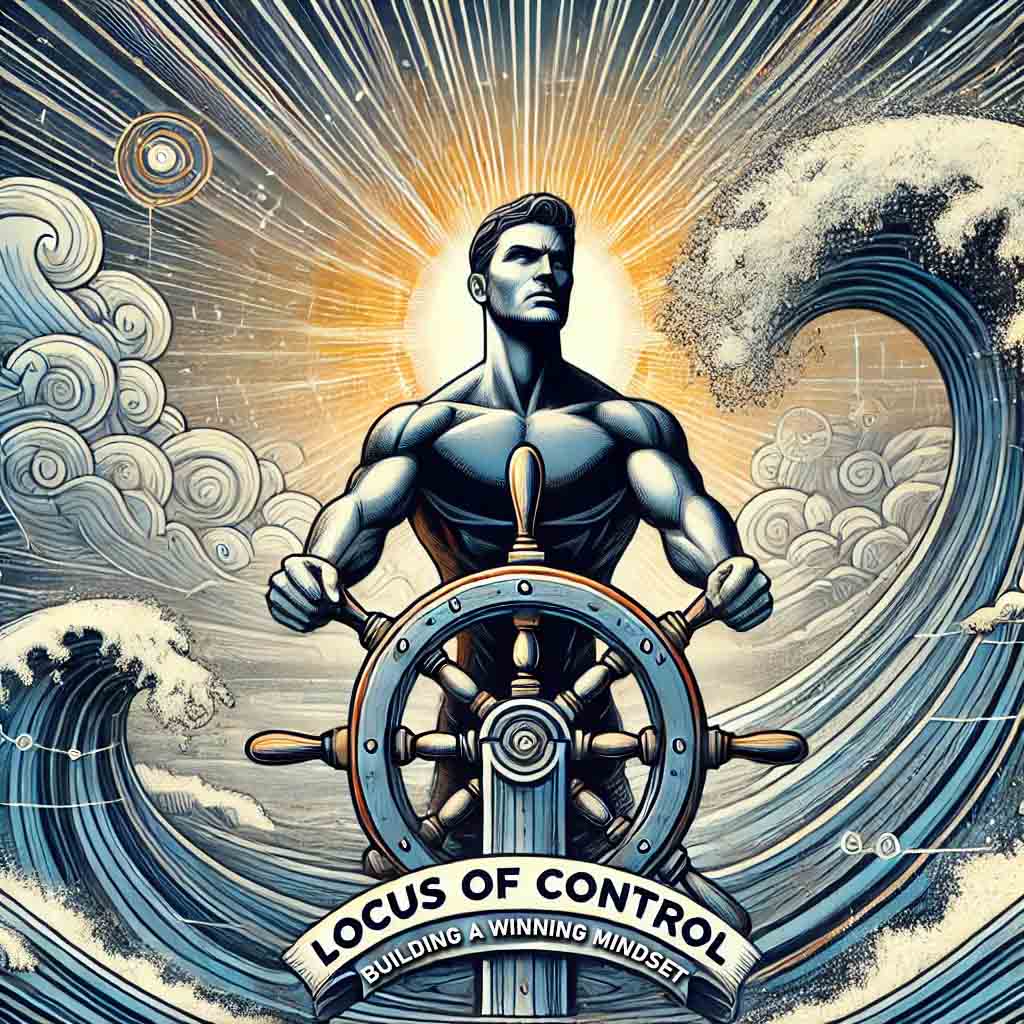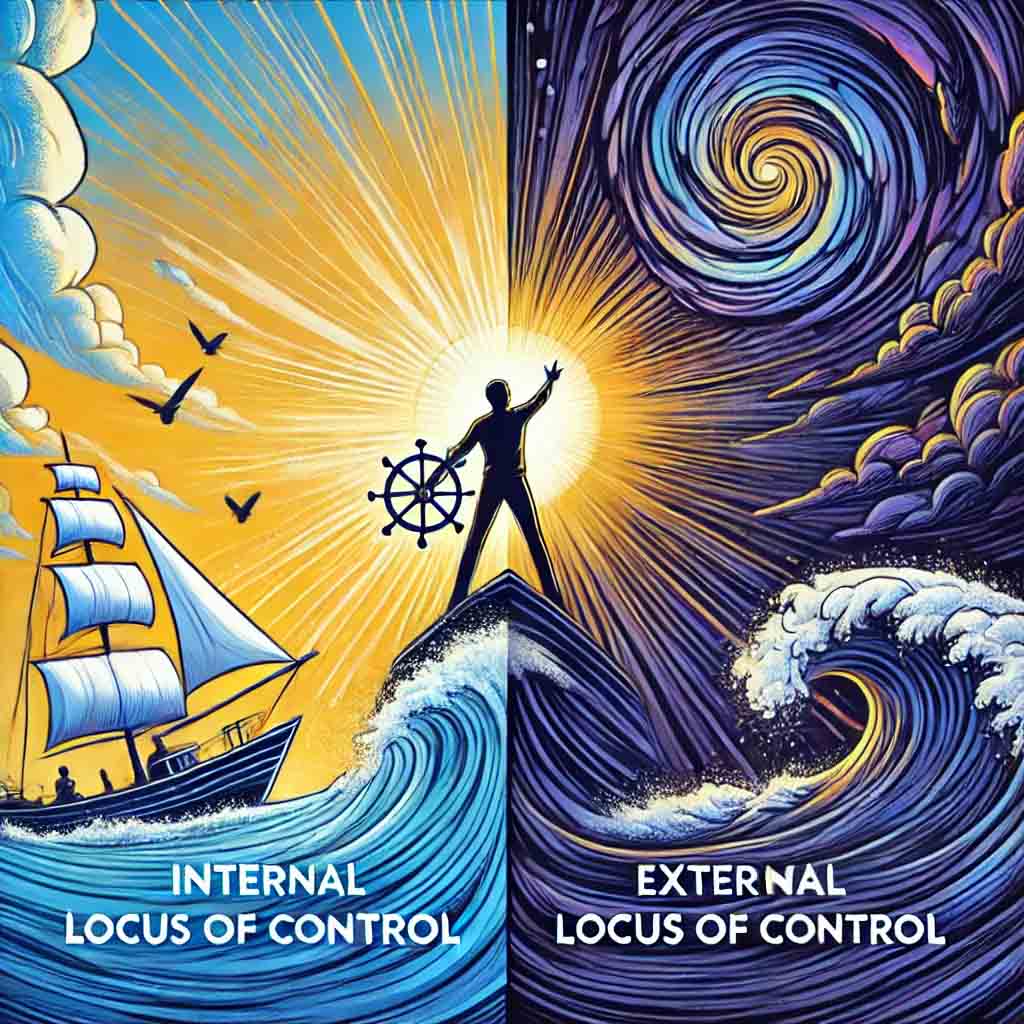
In the pursuit of greatness, whether in sports, business, or personal development, one of the most critical yet often overlooked factors is the concept of locus of control. This psychological framework is a cornerstone for building a winning mindset, allowing individuals to navigate challenges, seize opportunities, and maintain resilience in the face of adversity. Understanding and harnessing your locus of control can be the difference between a life defined by empowerment or one constrained by external forces.
What is Locus of Control?
Locus of control is a term coined by psychologist Julian Rotter in the 1950s. It refers to the degree to which individuals believe they have control over the outcomes of events in their lives. This belief system falls on a continuum between two extremes: internal control and external control.
Internal Locus of Control: Individuals with strong internal control believe that their actions, decisions, and efforts directly influence the results they experience. They see themselves as the architects of their destiny, understanding that their choices have a significant impact on their success or failure.
External Locus of Control: Conversely, those with strong external control attribute their outcomes to factors beyond their control, such as luck, fate, or the actions of others. These individuals often feel like pawns in a game, with little influence over their circumstances.
While most people fall somewhere in between these two extremes, the prevailing orientation of your locus of control can have profound implications on your mindset and approach to challenges.
The Connection Between Locus of Control and a Winning Mindset
A winning mindset is characterized by optimism, resilience, determination, and a relentless pursuit of goals. It is the mental foundation upon which success is built. The locus of control plays a crucial role in shaping this mindset by influencing how you perceive and react to the events around you.
Empowerment vs. Victimhood:

Individuals with internal control tend to adopt an empowering mindset. They see challenges as opportunities to learn and grow, believing that they have the power to influence the outcome. This sense of control fuels their motivation, driving them to take action even when faced with obstacles.
On the other hand, those with external control often fall into a victimhood mentality. They view challenges as insurmountable barriers imposed by external forces, which leads to feelings of helplessness and a lack of initiative. This mindset can create a self-fulfilling prophecy, where the lack of effort results in failure, reinforcing the belief that success is out of reach.
Responsibility and Accountability:
A key component of a winning mindset is taking responsibility for one’s actions and outcomes. Those with an internal locus of control are more likely to accept responsibility for their successes and failures. This accountability allows them to learn from their mistakes, make adjustments, and improve over time.
In contrast, an external locus of control can lead to a tendency to blame others or external circumstances for one’s failures. This deflection of responsibility hinders personal growth and prevents individuals from making the necessary changes to achieve their goals.
Resilience and Adaptability:
Resilience is the ability to bounce back from setbacks and continue pursuing goals despite adversity. An internal locus of control fosters resilience by reinforcing the belief that you have the power to overcome challenges. This mindset encourages adaptability, as individuals are more likely to see setbacks as temporary and within their control to change.
Those with an external locus of control may struggle with resilience, as they are more likely to view setbacks as permanent or out of their control. This can lead to a sense of defeatism and a reluctance to try again after failure.
Goal Setting and Achievement:
Individuals with an internal locus of control are more proactive in setting and pursuing goals. They believe that their efforts will directly impact their ability to achieve these goals, which motivates them to work hard and stay focused.
Conversely, those with an external locus of control may be less likely to set ambitious goals or put in the effort required to achieve them, believing that external factors will ultimately determine their success.
Real-Life Examples of Locus of Control in Action
To truly understand the impact of locus of control on building a winning mindset, it helps to look at real-life examples of individuals and scenarios where this concept has played a pivotal role.
Example 1: Michael Jordan’s Internal Locus of Control
Michael Jordan, widely regarded as one of the greatest basketball players of all time, is a prime example of someone with a strong internal locus of control. Jordan believed that his success was directly tied to his work ethic, determination, and relentless pursuit of excellence. His famous quote, “I’ve missed more than 9,000 shots in my career. I’ve lost almost 300 games. 26 times, I’ve been trusted to take the game-winning shot and missed. I’ve failed over and over and over again in my life. And that is why I succeed,” reflects his internal locus of control. Jordan understood that his failures were stepping stones to success and that he had the power to shape his destiny through his actions.
Example 2: The Rise of J.K. Rowling
J.K. Rowling, the author of the Harry Potter series, also exemplifies the power of an internal locus of control. Before becoming a literary sensation, Rowling faced numerous rejections from publishers and struggled with personal challenges, including financial hardship. However, she believed in her ability to succeed and continued to persevere despite the setbacks. Her internal locus of control fueled her determination to keep writing and pursuing her dream, ultimately leading to one of the most successful book series in history.
Example 3: The Dangers of an External Locus of Control in Sports
In contrast, consider the example of athletes who blame external factors for their failures—such as referees, weather conditions, or the actions of opponents. This external locus of control can lead to a defeatist attitude, where athletes feel that their success is out of their hands. This mindset can prevent them from taking the necessary steps to improve their performance, leading to a cycle of underachievement.
Example 4: The Business World and Locus of Control
In the business world, leaders with an internal locus of control are more likely to innovate, take calculated risks, and drive their companies forward. They understand that their decisions and strategies play a crucial role in the success or failure of their organization. On the other hand, leaders with an external locus of control may be more risk-averse, often waiting for external conditions to improve before taking action. This can lead to missed opportunities and stagnation.
Cultivating an Internal Locus of Control for a Winning Mindset
Building a winning mindset requires cultivating an internal locus of control. While some individuals may naturally lean towards an internal or external locus of control, it is possible to shift your mindset through conscious effort and practice.
Self-Reflection and Awareness:
The first step in shifting your locus of control is to become aware of your current mindset. Reflect on how you typically respond to challenges and setbacks. Do you tend to take responsibility for your actions, or do you blame external factors? Awareness is the first step towards change.
Focus on What You Can Control:
Start by identifying the aspects of your life and goals that are within your control. This could include your attitude, effort, and the decisions you make. By focusing on what you can control, you empower yourself to take action and influence the outcomes you desire.
Set Achievable Goals:
Break down your larger goals into smaller, achievable steps. This not only makes your goals more manageable but also reinforces the belief that your actions directly impact your progress. Each small victory will strengthen your internal locus of control.
Take Responsibility for Your Actions:
Embrace accountability for both your successes and failures. When you succeed, acknowledge the role your effort played in achieving that success. When you fail, analyze what you could have done differently and use it as a learning experience. This approach fosters a growth mindset and reinforces the belief that you have control over your outcomes.
Surround Yourself with Positive Influences:
The people you surround yourself with can have a significant impact on your mindset. Seek out individuals who embody internal control and a winning mindset. Their attitude and approach to challenges will inspire you to adopt a similar perspective.
Practice Resilience and Adaptability:
Life is full of unexpected challenges, but how you respond to them defines your success. Cultivate resilience by viewing setbacks as temporary and within your power to overcome. Develop adaptability by being open to new strategies and solutions when faced with obstacles.
Celebrate Your Progress:
Finally, take time to celebrate your achievements, no matter how small. Recognizing your progress reinforces the belief that your actions have a direct impact on your success, further solidifying your internal control of your mindset.
The Last Word on …
Locus of Control in Building a Winning Mindset
Your locus of control is a powerful determinant of your mindset and ultimately your success. By cultivating an internal locus of control, you empower yourself to take charge of your destiny, embrace challenges as opportunities for growth, and maintain resilience in the face of adversity. This mindset is the foundation upon which greatness is built, enabling you to achieve your goals and live a life defined by purpose and fulfillment.
In the journey to building a winning mindset, remember that you are the author of your story. The decisions you make, the effort you put in, and the resilience you demonstrate will determine the outcome. Embrace your power, take control, and watch as you turn your dreams into reality.
